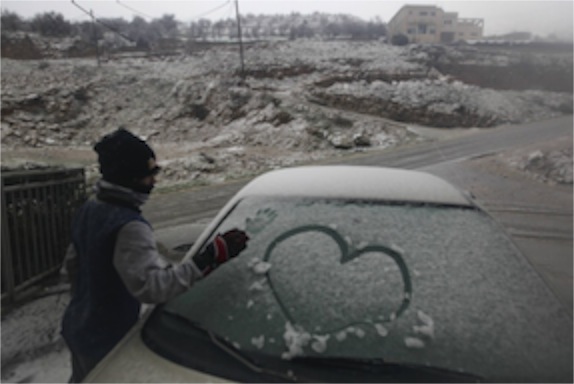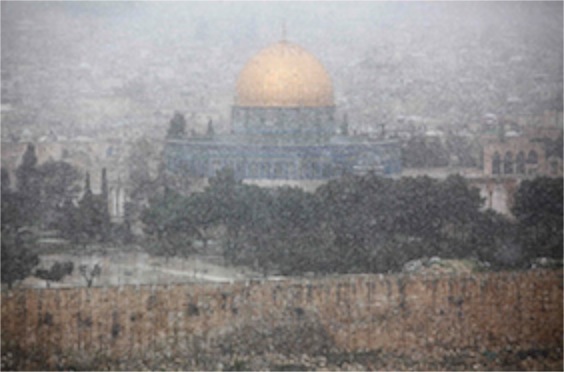Snow
10/01/13 05:39
Sometimes, when I am teaching about the Christmas story, I remind people that the birth of Jesus took place in a different part of the world. The scenes with the manger located in an outbuilding looking like a shed or barn and the sparkly snow falling are based on our cultural traditions and may not be quite what the first hearers of the story pictured when they thought of the scene. Bethlehem is closer to the equator than the places where I live. The weather is milder there. Luke’s Gospel reports that there were shepherds out in the fields keeping watch over their flocks by night. That probably meant that the weather was mild. Had there been a storm, the shepherds would have brought the flocks back to the town to be sheltered in the homes of the owners.
But they’re experiencing winter this week as storms sweep across the Middle East.
 It’s been snowing in the Golan Heights. Strong winds brought down trees in the al-Aqsa Mosque compound in Jerusalem. Towns in the West Bank have experienced flooding. In Jenin a bus carrying 30 Palestinian children had to be rescued from floodwaters by Israeli soldiers. Homes were flattened by heavy rains in Rafah in the Gaza Strip. Floodwaters overwhelmed the city’s drainage system in Amman, the capital of Jordan. Syrian refugees living in camps in northern Jordan experienced freezing temperatures, rain and wind. Unusually heavy snow cut off the main road linking Beirut with the Syrian capital Damascus. Heavy snow blanketed Damascus, with more in the forecast. Four people in Lebanon have died as the snow storm blanketed part of the country.
It’s been snowing in the Golan Heights. Strong winds brought down trees in the al-Aqsa Mosque compound in Jerusalem. Towns in the West Bank have experienced flooding. In Jenin a bus carrying 30 Palestinian children had to be rescued from floodwaters by Israeli soldiers. Homes were flattened by heavy rains in Rafah in the Gaza Strip. Floodwaters overwhelmed the city’s drainage system in Amman, the capital of Jordan. Syrian refugees living in camps in northern Jordan experienced freezing temperatures, rain and wind. Unusually heavy snow cut off the main road linking Beirut with the Syrian capital Damascus. Heavy snow blanketed Damascus, with more in the forecast. Four people in Lebanon have died as the snow storm blanketed part of the country.
It is winter in the Middle East. Forecasters have warned that the worst is yet to come. It is a couple of weeks late, but it seems that it does sometimes snow in that part of the world.
Meanwhile, forecasters have issued a winter storm watch for our part of the world for tonight through tomorrow. They rarely predict 100% chance of precipitation, but that’s what the forecast is showing right now. We might get as much as six inches by Saturday morning. That really isn’t too much snow for us. We like the snow and it is good for the health of the forest. Our ground is dry and the moisture will be much appreciated. It would be a concern if we had to travel across the state, but such a storm is unlikely to cause much of a disruption for us. We’ll get out our parkas and, who knows, I may even fire up my snow blower before the storm is over. I have a nice machine, but it doesn’t get much exercise some winters. It isn’t worth getting it out for a dusting. I can run the shovel across the driveway, but it is nice to have when the snow gets heavy.
But we are used to snow. We look forward to snow. With recent winters being light on the snow, we even hope that we will get more snow.
And our part of the country is set up for snow. The county and city have large trucks with big plows and machines for spreading sand and salt on slippery highways. We have efficient heating systems and lots of insulation in our homes. Our windows seal out the drafts and are designed for winter weather. About the only preparations that remain for us is to check the pantry to make sure that we have plenty of groceries for a few days and make sure the gas tanks of the vehicles are full so we don’t need to go to the stores if conditions get slippery. Getting snowed in for us is always a fun adventure that doesn’t last very long. And, in the case of an emergency, we have a reliable four-wheel drive. If I put chains on all four tires, we can make it to wherever we need to go in weather that is more severe than what we have in the forecast.
It is different in the Middle East. There are hundreds of thousands of refugees living in camps where the roof may be a light tent reinforced with a blue plastic tarp. A dirt floor may not be much of an inconvenience in dry weather. An old carpet can be spread and the place made livable. Conditions are vastly different when the dirt turns to mud. Keeping the water out of the tent can be a challenge when one lacks tools.
Conditions in the Middle East are record setting. It is the most severe storm to hit the region in a decade and the wettest in at least 20 years. Freezing and flooding are not a pleasant combination. Floodwaters are rising and there have been reports of winds gusting as high as 70 mph along the eastern Mediterranean coast. Most refugees do not have any source of heat in their tents. A few wood stoves exist within the camps, but firewood is scarce and fuel to heat is difficult to obtain.
 I watch the news from the Middle East with mixed feelings. There are some beautiful pictures of Jerusalem blanketed with snow. There are even a few pictures of people playing outdoors in the snow, building snowmen and throwing snowballs. But I know how dense the population is in that part of the world. I know how many people are living in substandard conditions. And I know how cold it can get and how hard it is to survive when one is wet. These storms will put strains on already overtaxed infrastructure. NGOs that provide support to refugees will need additional resources just to keep up. We will be reading of more deaths from this storm before it is over.
I watch the news from the Middle East with mixed feelings. There are some beautiful pictures of Jerusalem blanketed with snow. There are even a few pictures of people playing outdoors in the snow, building snowmen and throwing snowballs. But I know how dense the population is in that part of the world. I know how many people are living in substandard conditions. And I know how cold it can get and how hard it is to survive when one is wet. These storms will put strains on already overtaxed infrastructure. NGOs that provide support to refugees will need additional resources just to keep up. We will be reading of more deaths from this storm before it is over.
So, for now, I prefer to think of the birth of the Christ child occurring on a night when it didn’t snow and there weren’t storms. The child was born into poverty and his parents soon became refugees as they fled their country to save the life of their child in the face of the rage of Herod. Had it been stormy, the Holy Family would have been in the midst of the suffering.
Christ is still present with those who suffer.
But they’re experiencing winter this week as storms sweep across the Middle East.

It is winter in the Middle East. Forecasters have warned that the worst is yet to come. It is a couple of weeks late, but it seems that it does sometimes snow in that part of the world.
Meanwhile, forecasters have issued a winter storm watch for our part of the world for tonight through tomorrow. They rarely predict 100% chance of precipitation, but that’s what the forecast is showing right now. We might get as much as six inches by Saturday morning. That really isn’t too much snow for us. We like the snow and it is good for the health of the forest. Our ground is dry and the moisture will be much appreciated. It would be a concern if we had to travel across the state, but such a storm is unlikely to cause much of a disruption for us. We’ll get out our parkas and, who knows, I may even fire up my snow blower before the storm is over. I have a nice machine, but it doesn’t get much exercise some winters. It isn’t worth getting it out for a dusting. I can run the shovel across the driveway, but it is nice to have when the snow gets heavy.
But we are used to snow. We look forward to snow. With recent winters being light on the snow, we even hope that we will get more snow.
And our part of the country is set up for snow. The county and city have large trucks with big plows and machines for spreading sand and salt on slippery highways. We have efficient heating systems and lots of insulation in our homes. Our windows seal out the drafts and are designed for winter weather. About the only preparations that remain for us is to check the pantry to make sure that we have plenty of groceries for a few days and make sure the gas tanks of the vehicles are full so we don’t need to go to the stores if conditions get slippery. Getting snowed in for us is always a fun adventure that doesn’t last very long. And, in the case of an emergency, we have a reliable four-wheel drive. If I put chains on all four tires, we can make it to wherever we need to go in weather that is more severe than what we have in the forecast.
It is different in the Middle East. There are hundreds of thousands of refugees living in camps where the roof may be a light tent reinforced with a blue plastic tarp. A dirt floor may not be much of an inconvenience in dry weather. An old carpet can be spread and the place made livable. Conditions are vastly different when the dirt turns to mud. Keeping the water out of the tent can be a challenge when one lacks tools.
Conditions in the Middle East are record setting. It is the most severe storm to hit the region in a decade and the wettest in at least 20 years. Freezing and flooding are not a pleasant combination. Floodwaters are rising and there have been reports of winds gusting as high as 70 mph along the eastern Mediterranean coast. Most refugees do not have any source of heat in their tents. A few wood stoves exist within the camps, but firewood is scarce and fuel to heat is difficult to obtain.

So, for now, I prefer to think of the birth of the Christ child occurring on a night when it didn’t snow and there weren’t storms. The child was born into poverty and his parents soon became refugees as they fled their country to save the life of their child in the face of the rage of Herod. Had it been stormy, the Holy Family would have been in the midst of the suffering.
Christ is still present with those who suffer.